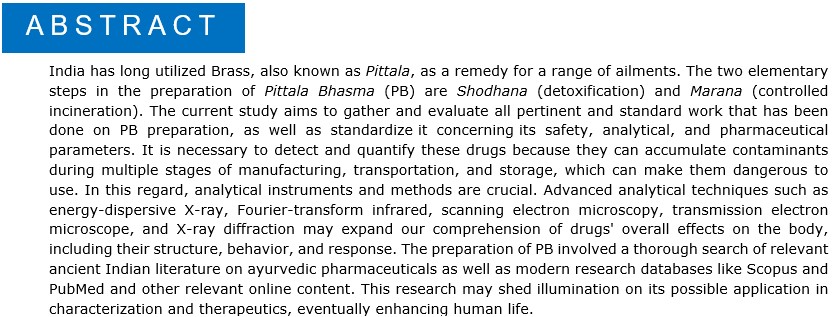Critical Review of Pharmaceutical, Analytical and Toxicity Characterization of Pittala Bhasma
DOI:
https://doi.org/10.21760/jaims.9.5.17Keywords:
Pittala, Pittala Bhasma, BrassAbstract
India has long utilized Brass, also known as Pittala, as a remedy for a range of ailments. The two elementary steps in the preparation of Pittala Bhasma (PB) are Shodhana (detoxification) and Marana (controlled incineration). The current study aims to gather and evaluate all pertinent and standard work that has been done on PB preparation, as well as standardize it concerning its safety, analytical, and pharmaceutical parameters. It is necessary to detect and quantify these drugs because they can accumulate contaminants during multiple stages of manufacturing, transportation, and storage, which can make them dangerous to use. In this regard, analytical instruments and methods are crucial. Advanced analytical techniques such as energy-dispersive X-ray, Fourier-transform infrared, scanning electron microscopy, transmission electron microscope, and X-ray diffraction may expand our comprehension of drugs' overall effects on the body, including their structure, behavior, and response. The preparation of PB involved a thorough search of relevant ancient Indian literature on ayurvedic pharmaceuticals as well as modern research databases like Scopus and PubMed and other relevant online content. This research may shed illumination on its possible application in characterization and therapeutics, eventually enhancing human life.
Downloads
References
Meena V, Bhushan S, Chaudhary A. Critical review on pharmaceutico-analytical and safety profile of Swarna Makshika Bhasma (chalcopyrite calx). J Drug Res Ayurvedic Sci 2021;6:3-11.
Rolli Ghildiyal et al: Pittala and its Formulations: A Review. International Ayurvedic Medical Journal {online} 2023 {cited May 2023}.
Sadanand Sharma , Rasa Tarangni, Edition 11, Motilaal Banarsidaas, Delhi, 2009, p 572.
Vagbhatacharya. Rasaratnasamuchya. In: Dattatreya Anant Kulkarni, editor. Rasa Ratna Sammuchya. Meharchand Lachhmandas Publications, New Delhi; 2020. p. 128.
Punam K, Yadevendra Y, Khem Chand S. Pittala (Brass) in Traditional Indian Knowledge System: A Review. International Journal of Ayurveda and Pharma Research. 2022;10(Suppl 2):70-78.
Sadanand Sharma , Rasa Tarangni, Edition 11, Motilaal Banarsidaas, Delhi, 2009, p 570-571.
Acharya Somdeva. Rasendra Chudamnai. In: SN Mishra, editor, Rasendra Chudamani, Chaukhambha Orientalia, Varanasi, 1984. P271-274.
Bhudeb Mookerjee. Rasa Jala Nidhi. In: SN Mishra, Edition 1984, Srigokul Mudranalaya, Varanasi, p 141-147.
Vaidya Yadavji Trikamji. Rasamritam. In: G P Rao, D Joshi, Edition 2003, Chaukhambha Sanskrit Bhawan, Varanasi, p 49- 51.
B S Dadupantha , Rasa Darpan. Edition 1992, Swami Prakashana, Patiyala, p 288-291.
V N Dwivedi. Rasendra Sambhava. Edition 1997, Krishnadas Academy, Varanasi, p 159-160.
Yashodhar Bhatt. Rasaprakash Sudhakar. In: SN Mishra. Edition 2013, Chaukhambha Orientalia, Varanasi, p 85-86
Sri Madhava. Ayurveda Prakasa. In: G S Mishra. Edition 2020, Chaukhambha Bharati Academy, Varanasi, p 423- 425.
SVR Shastri. Anand Kandam. Edition 1952, Madras Government Oriental Series, p 591-594.
Nagarjuna. Rasendra Mangalam. In: KHS Sharma. Edition 2003, Chaukhambha Orientalia, Varanasi, p 26.
RD Choube. Brihad Rasarajsunder. Edition 1998. Motilal Banarsidas, Delhi, p 95-100.
Siddha Nityanath, Rasratnakar, In: SN Mishra, Edition 2003, Chaukhambha Publishers, Varanasi, p 38.
Sadanand Sharma , Rasa Tarangni, Edition 11, Motilaal Banarsidaas, Delhi, 2009, p 571- 572.
Sribhava Misra. Bhavaprakasa. In: BS Mishra, Edition 2004, Chaukhambha Sanskrit Sansthan, Varanasi, p 839.
Acharya Sharngadhar. Sharngadhar Samhita. In: S Srivastava, Edition 2017, Chaukhambha Orientalia, Varanasi, p 261.
Sadanand Sharma, Rasa Tarangni, Edition 11, Motilaal Banarsidaas, Delhi, 2009, p 571- 570.
Kaimal VS, Vineeth PK, Ramesh NV, Pillai KU. Significance of Puta in Bhasmikarana with special reference to Sankha Bhasma. Journal of Ayurvedic and Herbal Medicine 2017; 3(4): Th222-224
Meena, Vandana; Bhushan, Shakti; Chaudhary, Anand. Critical review on pharmaceutical-analytical and safety profile of Swarna Makshika Bhasma (chalcopyrite calx). Journal of Drug Research in Ayurvedic Sciences 6(1):p 3-11, Jan–Mar 2021. | DOI: 10.4103/jdras.jdras_4_21
Kale, B., & Rajurkar, N. Synthesis and Characterization of Pittal Bhasma. JOURNAL OF ISAS VOLUME 1, ISSUE 3, JANUARY 2023.
Kumari P et al., Pharmaceutico-analytical and anti-bacterial study of Pittala Bhasma, M.D. (Ayu.) Thesis, Rishikul Ayurvedic Medical College, 2021.
Sheenam Rani et al: Overview on Ayurvedic Parameters of Bhasma Pariksha - An Ancient Indian Nanomedicine. International Ayurvedic Medical Journal {online} 2022 {cited August 2022}
Chaudhari, S. Y., Nariya, M. B., Galib, R., & Prajapati, P. K. (2016). Acute and subchronic toxicity study of Tamra Bhasma (incinerated copper) prepared with and without Amritikarana. Journal of Ayurveda and integrative medicine, 7(1), 23-29.
Prajapati, P. K., Sarkar, P. K., Nayak, S. V., Joshi, R. D., & Ravishankar, B. (2006). Safety and toxicity profile of some metallic preparations of Ayurveda. Ancient science of life, 25(3&4), 57-63.
Sharma R, Galib R, Prajapati PK. Good pharmacovigilance practice: Accountability of ayurvedic pharmaceutical companies. Anc Sci Life 2017;36:167-9.
Sharma R, Hazra J, Prajapati PK. Knowledge and awareness of pharmacovigilance among Ayurveda physicians in Himachal Pradesh. Anc Sci Life 2017;36:234-5.















